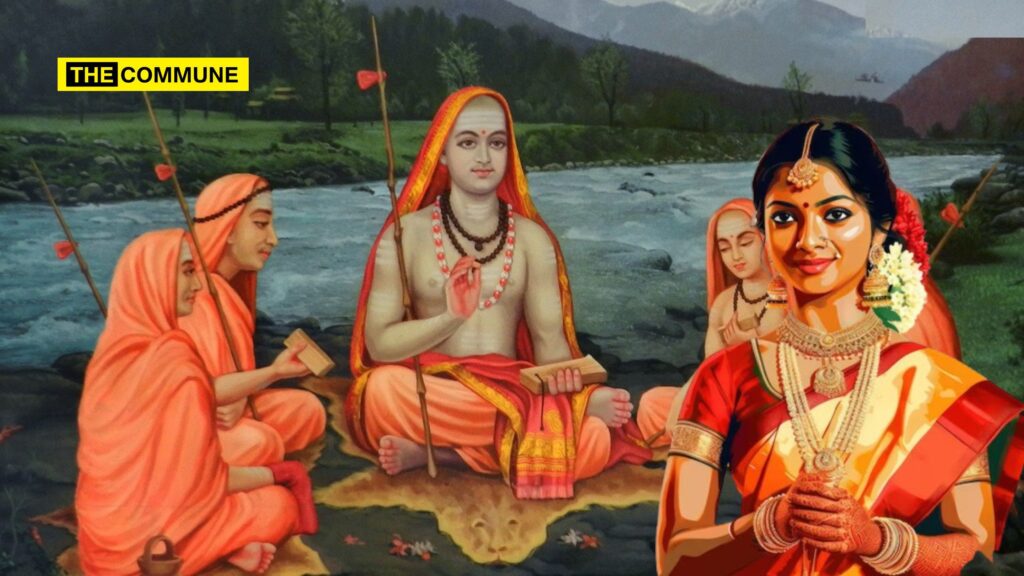Adi Shankaracharya’s influential role in revitalising the Vedic religion and his unwavering commitment to the respectful treatment of women demands attention in contemporary discussions on women’s rights. His teachings provide a compelling framework for upholding the dignity and honouring the contributions of women within the family, community, and workplace, offering essential principles for today’s society to uphold.
In the context of Sanatana Dharma or Hinduism, it is often propagated that women are not respected and their rights are denied. This raises questions: Are women genuinely oppressed in our culture? If so, since when?
Adi Shankaracharya played a significant role in the religious revival across India. He revitalized the Vedic religion and is recognized as the founding teacher of Shanmata (6-Sects). As a Jagadguru, he established monasteries throughout India to promote Vedic traditions. He composed devotional hymns and encouraged people to follow the path of devotion. He established temple worship practices nationwide and performed significant religious ceremonies to stabilize and develop the religion.
In the 2,500 years since Adi Shankaracharya’s time, Hinduism has not experienced a decline. No force, whether by sword or politics, has been able to diminish it. Jagadguru Adi Shankaracharya’s foundation for this religion plays a crucial role, including his treatment of women.
Contemporary advocates for women’s rights reference three main areas: family, community, and workplace. All three areas reflect Adi Shankaracharya’s treatment of women as a guiding example.
Adi Shankaracharya, dedicated to asceticism, sought permission from his mother before pursuing his spiritual practices. Despite renouncing worldly life, he did not abandon his duties to his mother and remained committed to fulfilling them. He demonstrated the love and respect a son should show to his mother. For instance, when his mother expressed a wish to bathe in the holy Alwaipuzhai River but was unable to walk due to mobility issues, he made the river flow through their village to fulfil her wish. This respect towards his mother indicates his broader directive to honour women within the family.
Adi Shankaracharya’s influence reached beyond just religious practice and extended to societal concerns. As a celibate student, he lived the life of a beggar, or bhikshuk, as part of his spiritual discipline. On one occasion, while seeking alms, he visited the home of a very impoverished woman who offered him a few amlas (Indian gooseberries) for his bowl. Moved by her dire situation, Shankaracharya composed a prayer called ‘Sri Lakshmi Kanakadhara Stotra’. Miraculously, his heartfelt prayer led to a sudden and bountiful rain of gold, transforming her impoverished condition. He believed that poverty, even when due to one’s occupation, should not undermine the dignity and respectful treatment of individuals. He argued that a woman of kind disposition should not suffer and demonstrated through his actions that compassionate treatment of women is a moral duty.
Additionally, Adi Shankaracharya’s interactions show how women should be treated in society and the workplace. He debated with various scholars across India to establish the Advaita philosophy of the Vedas. During one such debate with Mandana Mishra, Adi Shankaracharya accepted Mandana Mishra’s wife, Ubhaya Bharati, a renowned scholar, as the judge. Recognizing and valuing Ubhaya Bharati’s erudition exemplifies overcoming patriarchal bias and appreciating women’s intellectual capabilities.
In another notable incident, while debating in Kashmir, Adi Shankaracharya honoured a knowledgeable woman by awarding her a ‘Tarangam’ or crown-like turban, recognizing her scholarly achievements. This continues in the tradition of acknowledging women’s excellence in knowledge. Adi Shankaracharya also gave precedence to female deities in the monasteries he established, reinforcing the idea of Shakti (female divine energy) and the belief that the world is incomplete without feminine power.
People in modern India still follow the practices and hymns established by Adi Shankaracharya, and his approach towards treating women with dignity remains relevant. Returning to these principles could contribute to a better future, while modern discourses on women’s rights can benefit from reflecting on these traditional values. Today’s women, inheriting a legacy of knowledge and wealth, are encouraged to consider these perspectives.
(With inputs from Dinamani)
Subscribe to our channels on Telegram, WhatsApp, and Instagram and get the best stories of the day delivered to you personally.

